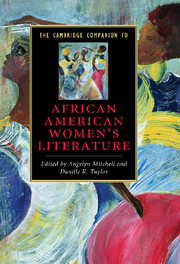Book contents
- Frontmatter
- Introduction
- Part 1 History, contexts, and criticism
- Part II Genre, gender, and race
- 6 African American women and the United States slave narrative
- 7 Autobiography and African American women’s literature
- 8 “Even some fiction might be useful”: African American women novelists
- 9 African American women poets and the power of the word
- 10 African American women in the performing arts
- 11 African American women writers of children’s and young adult literature
- 12 African American women essayists
- 13 African American women writers and the short story
- 14 African American women writers and popular fiction: theorizing black womanhood
- Bibliography
- Index
12 - African American women essayists
from Part II - Genre, gender, and race
Published online by Cambridge University Press: 28 July 2009
- Frontmatter
- Introduction
- Part 1 History, contexts, and criticism
- Part II Genre, gender, and race
- 6 African American women and the United States slave narrative
- 7 Autobiography and African American women’s literature
- 8 “Even some fiction might be useful”: African American women novelists
- 9 African American women poets and the power of the word
- 10 African American women in the performing arts
- 11 African American women writers of children’s and young adult literature
- 12 African American women essayists
- 13 African American women writers and the short story
- 14 African American women writers and popular fiction: theorizing black womanhood
- Bibliography
- Index
Summary
To read the earliest essays of African American women writers is to discover that black women have always been keenly aware of the radical power of the word to transform their own lives and those of their community. It is perhaps no surprise that many of them chose the essay as the genre that would best enable them to address their concerns - be they spiritual, social, or political - in the public sphere. The first question that comes to mind, of course, is why would women of African heritage on American soil choose the essay rather than other available genres for putting pen to paper? There is no single answer to this question because the realities that propelled each woman to write and to choose the essay as the medium to communicate her ideas were varied. It could be argued, however, that the genre of the essay, by its very nature, connects an author with an audience through some stated issue of importance, with an expressed goal of engaging that audience through public discourse on paper about that issue in a way that invokes a response from the community of readers. It could further be argued, that the ways in which black women had been silenced, marginalized, and denied a voice in the public sphere, by both black men and white people of both genders, made the essay a convenient mode of subverting and circumventing the power of those who were otherwise not open to their thoughts and ideas. African American women could write their speeches and essays, sometimes in words excerpted from their own journals, diaries, and letters, not only to give voice to their thoughts and ideas, but also to express the breadth and depth of those ideas without the literary concerns that fiction, poetry, drama or other forms of belles lettres might create for them. Free from having to embellish their ideas through language and structures particular to other genres, black women chose the essay to employ the power of the word in a more direct unencumbered way for their audiences.
- Type
- Chapter
- Information
- The Cambridge Companion to African American Women's Literature , pp. 224 - 244Publisher: Cambridge University PressPrint publication year: 2009
- 1
- Cited by

